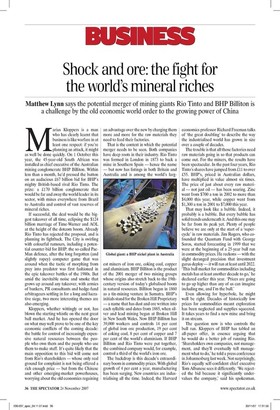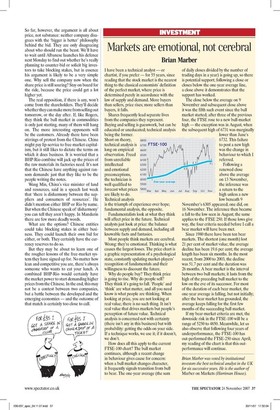Shock and ore: the fight for the world's mineral riches
Matthew Lynn says the potential merger of mining giants Rio Tinto and BHP Billiton is a challenge by the old economic world order to the growing power of China Manus Kloppers is a man who has clearly learnt that business is like warfare in at least one respect: if you're planning an attack, it might as well be done quickly. On 1 October this year, the 45-year-old South African was installed as chief executive of the Australian mining conglomerate BHP Billiton. Within less than a month, he'd pressed the button on an audacious £67 billion bid for BHP's mighty British-based rival Rio Tinto. The prize: a £170 billion conglomerate that would be far and away the world leader in its sector, with mines everywhere from Brazil to Australia and control of vast reserves of mineral riches.
If successful, the deal would be the biggest takeover of all time, eclipsing the $124 billion marriage of Time-Warner and AOL at the height of the dotcom boom. Already Rio Tinto has rejected the proposal, and is planning its fightback. The City is swirling with colourful rumours, including a potential counter-bid for BHP: the so-called PacMan defence, after the long forgotten (and slightly ropey) computer game that was around when the tactic of morphing from prey into predator was first fashioned in the epic takeover battles of the 1980s. But amid the inevitable noise and smoke that grows up around any takeover, with armies of bankers, PR consultants and hedge-fund arbitrageurs settling in for a long and lucrative siege, two more interesting themes are also emerging.
Kloppers, whether wittingly or not, has blown the starting whistle on the next great bull market. And he has opened the door on what may well prove to be one of the key economic conflicts of the coming decade: the battle for control of increasingly expensive natural resources between the people who own them and the people who use them to make stuff. It's quite likely that the main opposition to this bid will come not from Rio's shareholders — whose only real ground for complaint is not being offered a rich enough price — but from the Chinese and other emerging-market powerhouses, worrying about the old economies regaining an advantage over the new by charging them more and more for the raw materials they need to feed their factories.
That is the context in which the potential merger needs to be seen. Both companies have deep roots in their industry. Rio Tinto was formed in London in 1873 to back a mine in Southern Spain — hence the name — but now has listings in both Britain and Australia and is among the world's largest miners of iron ore, coking coal, copper and aluminium. BHP Billiton is the product of the 2001 merger of two mining groups whose origins also stretch back to the 19thcentury version of today's globalised boom in natural resources. Billiton began in 1860 as a tin-mining venture in Sumatra. BHP's initials stand for the Broken Hill Proprietary — a name that has dust and ore written into each syllable and dates from 1885, when silver and lead mining began at Broken Hill in New South Wales. Now BHP Billiton has 39,000 workers and controls 14 per cent of global iron ore production, 19 per cent of coking coal, 8 per cent of copper and 7 per cent of the world's aluminium. If BHP Billiton and Rio Tinto were put together, the combined company would, for example, control a third of the world's iron ore.
The backdrop is this decade's extraordinary boom in commodity prices. With global growth of 4 per cent a year, manufacturing has been surging. New countries are industrialising all the time. Indeed, the Harvard economics professor Richard Freeman talks of `the great doubling' to describe the way the industrialised world has grown in size over a couple of decades.
The trouble is that all those factories need raw materials going in so that products can come out. For the miners, the results have been spectacular. In the past four years, Rio Tinto's shares have jumped from £11 to over £55. BHP's, priced in Australian dollars, have multiplied in value almost six times. The price of just about every raw material — not just oil — has been soaring. Zinc went from $700 a ton in 2002 to more than $4,000 this year, while copper went from $1,300 a ton in 2001 to $7,000 this year.
That may look like a bubble. Indeed, it probably is a bubble. But every bubble has solid trends underneath it. And this one may be far from its peak yet. Plenty of people believe we are only at the start of a 'supercycle' in raw materials. Jim Rogers, who cofounded the Quantum Fund with George Soros, started forecasting in 1999 that we were at the beginning of a 25-year bull run in commodity prices. He reckons — with the slight deranged precision that investment gurus deploy — it will run at least until 2022. 'This bull market for commodities including metals has at least another decade to go,' he declared earlier this year. 'Prices are going to go up higher than any of us can imagine including me, and I'm the bull.'
Even allowing for hyperbole, he might well be right. Decades of historically low prices for commodities meant exploration has been neglected and supplies squeezed. It takes years to find a new mine and bring it on stream.
The question now is who controls the bull run. Kloppers of BHP has tabled an all-paper offer, in essence arguing that he would do a better job of running Rio. 'Shareholders own companies, not management, and they'll eventually tell management what to do,' he told a press conference in Johannesburg last week. Not surprisingly, Rio's equally self-confident chief executive Tom Albanese sees it differently. 'We rejected the bid because it significantly undervalues the company,' said his spokesman.
So far, however, the argument is all about price, not substance: neither company disagrees with the 'bigger is better' philosophy behind the bid. They are only disagreeing about who should run the beast. We'll have to wait until Albanese launches his defence next Monday to find out whether he's really planning to counter-bid or solicit big investors to take blocking stakes, but in essence his argument is likely to be a very simple one. Why sell the company now when the share price is still soaring? Stay on board for the ride, because the price could get a lot higher yet.
The real opposition, if there is any, won't come from the shareholders. They'll decide whether they can make more from selling out tomorrow, or the day after. If, like Rogers, they think the bull market in commodities is only just starting, many of them will hang on. The more interesting opponents will be the customers. Already there have been stirrings of protest from the Chinese. China might pay lip-service to free-market capitalism, but it still likes to dictate the terms on which it does business. It is worried that a BHP-Rio combine will jack up the prices of the raw materials its factories need. It's not that the Chinese have anything against ransom demands: just that they like to be the people writing the notes.
Wang MM, China's vice minister of land and resources, said in a speech last week that 'there is disharmony between the suppliers and consumers of resources'. He didn't mention either BHP or Rio by name. But when the Chinese speak of 'disharmony' you can tell they aren't happy. In Mandarin there are few more deadly words.
What are the options? Chinese entities could take blocking stakes in either business. They could launch their own bid for either, or both. They certainly have the currency reserves to do so.
But they may be about to learn one of the rougher lessons of the free-market system they have signed up for. No matter how lean and competitive you are, there's always someone who wants to eat your lunch. A combined BHP-Rio would certainly have the market power to start demanding higher prices from the Chinese. In the end, this may not be a contest between two companies, but a battle between the developed and the emerging economies — and the outcome of that match is certainly too close to call.







































































 Previous page
Previous page